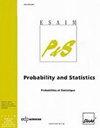与多项分布有关的某一类统计量的大偏差的概率
IF 0.6
4区 数学
Q4 STATISTICS & PROBABILITY
引用次数: 3
摘要
设η = (η1,…,η n)为参数n = η1 +⋯+ η n且pm > 0, m = 1,…,n, p1 +⋯+ pN = 1的多项式随机向量。我们假设N→∞,maxpm→0为N→∞。研究了形式为h1(η1) +⋯+ hN(ηN)的统计量的大偏差概率,其中hm(x)是非负整数值参数的实值函数。作为一般定理的结果,导出了幂散度统计量及其最流行的特殊变体的新的大偏差结果,以及几种计数统计量的大偏差结果。本文章由计算机程序翻译,如有差异,请以英文原文为准。
The probabilities of large deviations for a certain class of statistics associated with multinomial distribution
Let η = (η1, …, ηN) be a multinomial random vector with parameters n = η1 + ⋯ + ηN and pm > 0, m = 1, …, N, p1 + ⋯ + pN = 1. We assume that N →∞ and maxpm → 0 as n →∞. The probabilities of large deviations for statistics of the form h1(η1) + ⋯ + hN(ηN) are studied, where hm(x) is a real-valued function of a non-negative integer-valued argument. The new large deviation results for the power-divergence statistics and its most popular special variants, as well as for several count statistics are derived as consequences of the general theorems.
求助全文
通过发布文献求助,成功后即可免费获取论文全文。
去求助
来源期刊

Esaim-Probability and Statistics
STATISTICS & PROBABILITY-
CiteScore
1.00
自引率
0.00%
发文量
14
审稿时长
>12 weeks
期刊介绍:
The journal publishes original research and survey papers in the area of Probability and Statistics. It covers theoretical and practical aspects, in any field of these domains.
Of particular interest are methodological developments with application in other scientific areas, for example Biology and Genetics, Information Theory, Finance, Bioinformatics, Random structures and Random graphs, Econometrics, Physics.
Long papers are very welcome.
Indeed, we intend to develop the journal in the direction of applications and to open it to various fields where random mathematical modelling is important. In particular we will call (survey) papers in these areas, in order to make the random community aware of important problems of both theoretical and practical interest. We all know that many recent fascinating developments in Probability and Statistics are coming from "the outside" and we think that ESAIM: P&S should be a good entry point for such exchanges. Of course this does not mean that the journal will be only devoted to practical aspects.
 求助内容:
求助内容: 应助结果提醒方式:
应助结果提醒方式:


